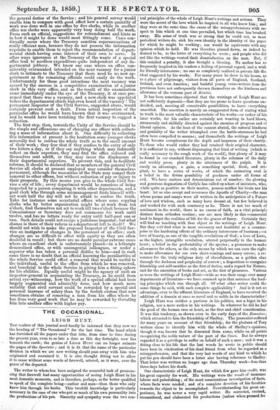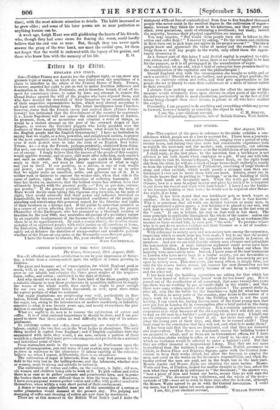THE OCCASIONAL.
LEIGH HUNT.
THE readers of this journal need hardly be informed that they now see the heading of " The Occasional " for the last time. The hand which has furnished all the papers under that title, from time to time during the present year, even to so late a date as this day fortnight, now lies beneath the earth; the genius of Lzron HUNT can no longer animate the pages of the Spectator; and it is fit that the name of the particular division in which we are now writing should pass away with him who originated and sustained it. It is also thought fitting not to allow it to cease without some words of farewell, uttered, as it were, over the grave of the departed.
The writer to whom has been assigned the mournful task of pronoun- cing that farewell had many opportunities of seeing Leigh Hunt in his most, domestic moments, and is therefore, perhaps, so far better qualified to speak of the complete being—author and man—than those who only knew him through his books. This twofold knowledge is particularly necessary in the case of one who put so much of his own personality into the productions of his pen. Sincerity and syrripathy were the two cen- tral principles of the whole of Leigh Hunt's writings and actions. They were the secret of the love which he inspired in all who knew him ; and they were at the same time the cause of the misapprehensions with re- spect to him which at one time prevailed, but which time has brushed away. His sense of truth was so strong that he could not, as most periodical writers do, sink his own identity in the identity of the paper for which he might be working; nor would he equivocate with any opinion which he held. He was therefore pinned down, as indeed he desired to be, to the letter of everything he wrote ; and people who did not like the writings vented their dissniiRfaction on. the man. But, if this entailed a penalty, it also brought a blessing. No author has so frequently inspired in his readers a feeling of personal regard,. and a wish for friendly intercourse ; no one so completely realized in private life the ideal suggested by his works. For many years he drew to his house, as to a place of pilgrimage, visitors from all parts of England, Scotland, Ireland, and even America ; and bashful young verse-writers from the provinces have not unfrequently thrown themselves on the kindness and allowance of the veteran poet of Rimini.
It has been sometimes objected that the writing of Leigh Hunt are not sufficiently dogmatic—that they are too prone to leave questions un- decided, and, mooting all conceivable possibilities, to leave everything unsettled. The assertion is merely an exaggerated form of stating what in truth is the most valuable characteristic of his works—or rather of his later works, for his earlier are certainly not wanting in hard blown, strenuously and skilfully directed against the enemies of progress and of liberal opinion. As the heat of the contest abated, the natural kindness and geniality of the writer triumphed over the battle-sternness he had often been compelled to assume; and thenceforth the writings of Leigh Hunt became conspicuous for the depth and largeness of their charity. To those who would rather they had retained their original character, it is sufficient to say, without disparaging that kind of writing (which is really necessary in the rough work of the world), that plenty of it may be found in our standard literature, plenty in the columns of the daily and weekly press, plenty in the utterances of the pulpit. It is surely an advantage, a gain, a something special, fresh, and ori- ginal, to have a series of works, of which the animating soul is a belief in the divine possibility of goodness under all farina of evil. We have smiters and denunciators out of number; the glowing and generous dogmatism of Carlyle has called up a host of imitators, who, while quite as positive as their master, possess neither his brain nor his heart : let us also accept and reverence the Apostle of Charity—the man whose poems and essays were all written in the anticipation of a Future of love and wisdom, such as many have dreamt of, but few believed in and worked for with such constancy as he. There is not too much of sentiment in the world; there is no excess of faith, as a vital principle distinct from orthodox routine ; nor are men likely in this commercial land to forget the realities of life for the graces of fancy. Certainly they will find no teaching with that object in the writings of Leigh Hunt. But they will find what is most necessary and healthful as a counter- poise to the hardening effects of the ordinary intercourse of business ;--a love of beauty, as one of the tangible revelations of God; a love of Love, as the higher, intangible revelation, uttered perpetually to the human heart; a belief in the perfectability of the species ; a proneness to make allowances for others, as the only means by which we can earn the right to make allowances for our own short-comings and many errors; a re- verence for the truly religious duty of cheerfulness, as a golden clue through the darkness and perplexity of sorrow ; a disposition to recognize friendship and self-sacrifice as the first of duties, and a regard for Nature, and for the amenities of books and art, as the first of pleasures. Various as were the writings of Leigh Hunt—wide as was their range over many departments of literature—we have summed up in that sentence the lead- ing principles which run through all. Of what other writer could the same things be said, with such complete applicability ? And is it not an advantage, even to the affluent literature of England, to have received the addition of a domain at once so novel and so noble in its characteristics?
Leigh Hunt was neither a partisan in his politics, nor a bigot in his religion, nor a mere author in his writings. In whatever he did he had the good of the human race at heart, as the first and chief consideration. It was this tendency, as shown even in the early days of the Examiner, which attracted to him the friendship of Shelley. The journalist suffered for many years on account of that friendship ; for the phalanx of Tory writers chose to identify him with the whole of Shelley's opinions, though it was known that he dissented from some, while on all points recognizing the noble nature of the poet of the Cenci. But he always regarded it as a privilege to suffer on behalf of such a man; and it was a fitting close to his life that the last words he wrote in public should have been in vindication of his dead friend from what he regarded as a misapprehension, and that the very last words of any kind to which he put his pen should have been a letter also having reference to Shelley. That letter was written no longer ago than Thursday week—less than three days before his death. One characteristic of Leigh Hunt, for which few gave him credit, was his great capacity for work. His writings were the result of immense labour and painstaking; of the most conscientious investigation of facts, where facts were needed ; and of a complete devotion of his faculties towards the object to be accomplished. Notwithstanding his great ex- perience, he was never a very rapid writer. He corrected, excised, reconsidered, and elaborated his productions (unless when pressed for
time), with the most minute attention to details. The habit increased as he grew older ; and some of his later poems are as near perfection as anything human can be.
A week ago, Leigh Hunt was still gladdening the hearts of his friends, who, though they had some cause for fearing the worst, could hardly believe that the end was so near. But, though they can never again answer the grasp of the true hand, nor meet the cordial eyes, let them not forget that the world is endowed with the legacy of his genius, and
those who knew him with the memory of his life. E. 0.



























 Previous page
Previous page